Ahmed Abdelrazzaq isn’t quite sure where his home is. Born 35 years ago to Sudanese refugees in a Palestinian camp near Damascus, Syria, he later fled to Lebanon as the Syrian war erupted in 2011.
Eventually, he found something of a stable life in Bint Jbeil, a town in south Lebanon along the border with Israel. He got work as a farm laborer and married a Palestinian woman, Ghofran. Together they built their family of six.
That all came to a terrifying halt one day a little more than a month ago, when Israel ramped up its deadly bombing of south Lebanon after a year of cross-border attacks between the Lebanese political party and armed group Hezbollah and Israeli forces. “My kids were scared. They’d tell me, ‘Baba, there’s a rocket!’”
That day would unfold into the deadliest in Lebanon since the civil war, Israeli bombs killing hundreds of people across the south and the Bekaa Valley. In the ensuing weeks, the violence would displace more than a million people, according to the UN.
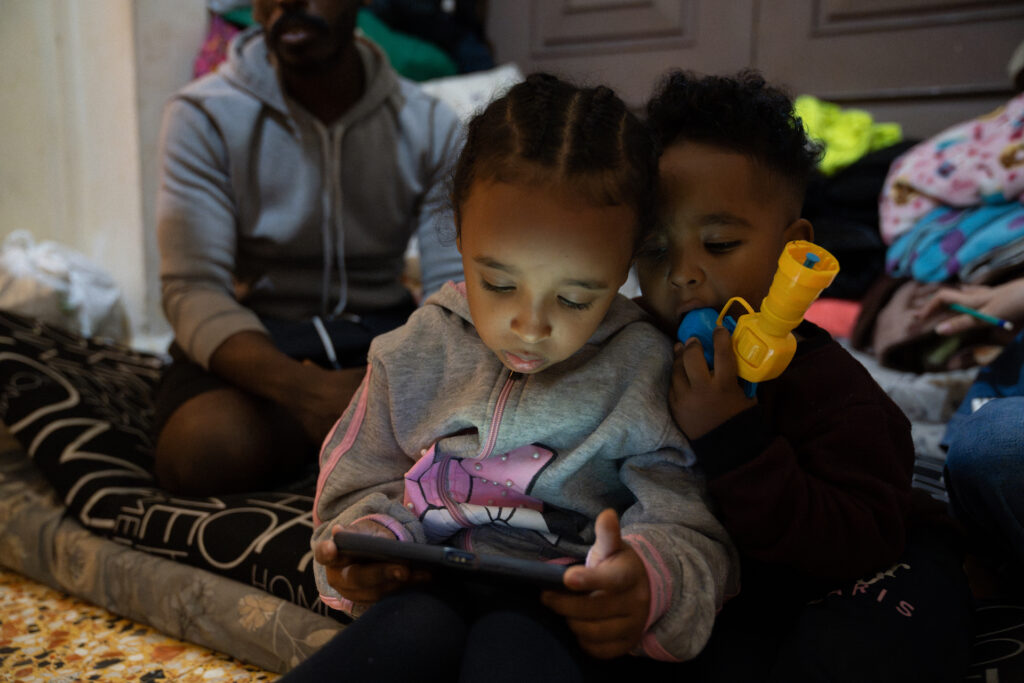
Abdelrazzaq and his family fled, too, on foot, with the clothes on their backs and little else. For several days they slept outside in the bush, on cardboard scraps they found on the side of the road. The children grew hungrier.
Eventually, they made it to Sidon, a city on the coast about 44 kilometers (27 miles) south of Beirut, where Abdelrazzaq says the government’s official displacement centers rejected them — they aren’t Lebanese citizens.
Unlikely Shelter
Now, after trekking further north, they and several dozen other Sudanese workers, their spouses, and children are sheltering in the Sudanese Club, along a leafy sidestreet of Beirut’s bustling Hamra district. More than 200 others are also staying in nearby apartments and a church. Still others, without internet connection or information of where to go, are sleeping on the streets.
The club was founded in 1967 by itinerant Sudanese cooks who worked in the homes of elite Lebanese figures — including the likes of former Prime Minister Rachid Karami and Progressive Socialist Party founder Kamal Joumblatt. The founders once hosted Malcolm X and, nearly a decade later, famed American boxer Muhammad Ali.
It is the official cultural hub for the 14,600 Sudanese people who live in Lebanon, according to the latest count by the UN’s International Organization for Migration (IOM).
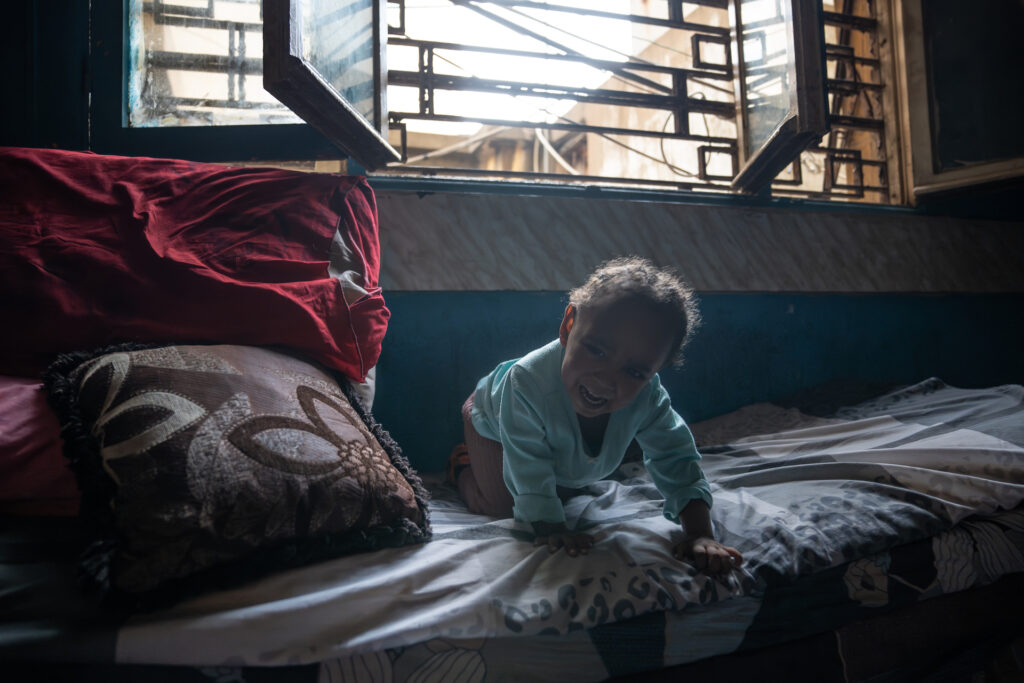
Last time I visited, more than a year ago, the club’s backrooms were filled with men relaxing over games of dominoes and poker. Antique incense pots lined the walls, next to faded Sudan tourism posters from decades past.
Now, those rooms are filled with thin mattresses and the mishmash of personal belongings that the families here were able to scrounge together before fleeing their homes for safety. Young children scream and giggle, weaving through the handful of rooms with donated Teletubby and Raggedy Ann dolls.
It’s all they have for now. Besides Abdelrazzaq, cases are “widespread” of non-Lebanese facing rejection from Lebanon’s official displacement shelters, according to Kareem Nofal from the Anti-Racism Movement (ARM). The group advocates for migrant workers in Lebanon.
Turned Away
Dara Foielle, from the advocacy group Migrant Workers Action (MWA), also says such cases are widespread, though it’s impossible to know the full scope as the cases aren’t all reported officially. “In general, it’s been an official policy [to reject non-Lebanese from the official shelters],” she adds. Reached by phone, an official from the government’s shelter center operations room denied reports that the facility had turned away non-Lebanese citizens.
Other displaced Sudanese people have been moving in with friends, or nowhere at all.
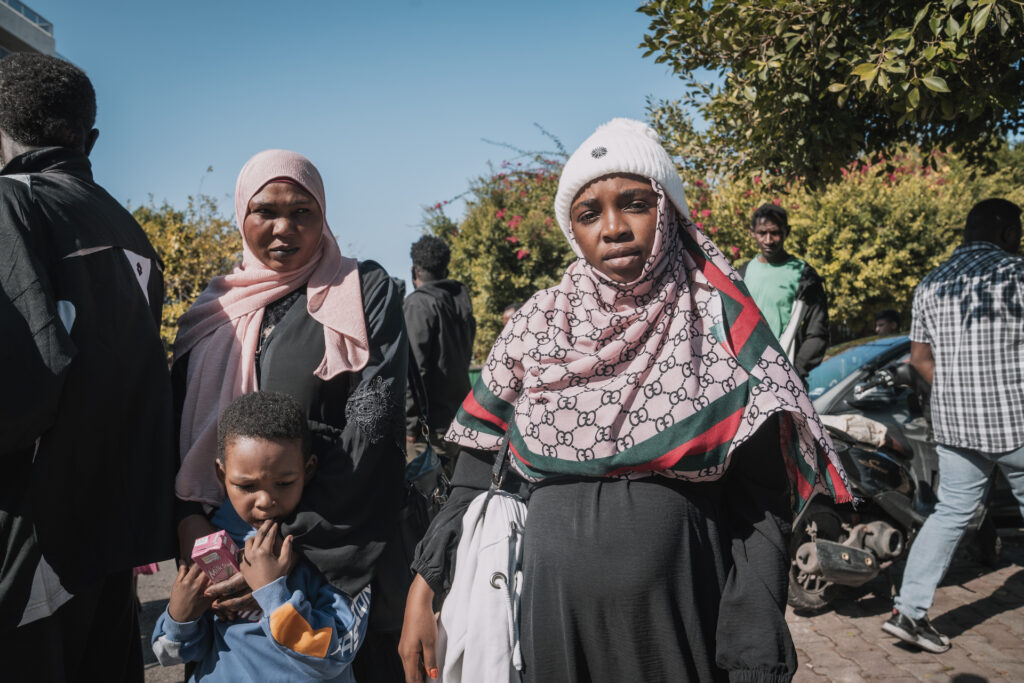
One woman, six-months-pregnant Adela Omar, told me this week that after she and her husband fled Ghobeiry — a neighborhood in Beirut’s southern suburbs now under regular Israeli fire — they simply found a spot on the side of the road and slept there.
Weeks later, the couple are still living on mattresses they set up in downtown Beirut, with precious few belongings. She and her husband still aren’t sure where they’ll end up living out the last three months of her pregnancy, before they welcome their first child.
No Way Home
Meanwhile, of the dozen or so Sudanese families I spoke with this week, none said they could return to Sudan — itself suffering a deadly countrywide war since April 2023. At the time, fighting ignited between the Sudanese army and paramilitary Rapid Support Forces (RSF).
The months since then have seen more than 20,000 people killed in a “perfect storm of crisis,” World Health Organization director Tedros Adhanom Ghebreyesus stated last month.
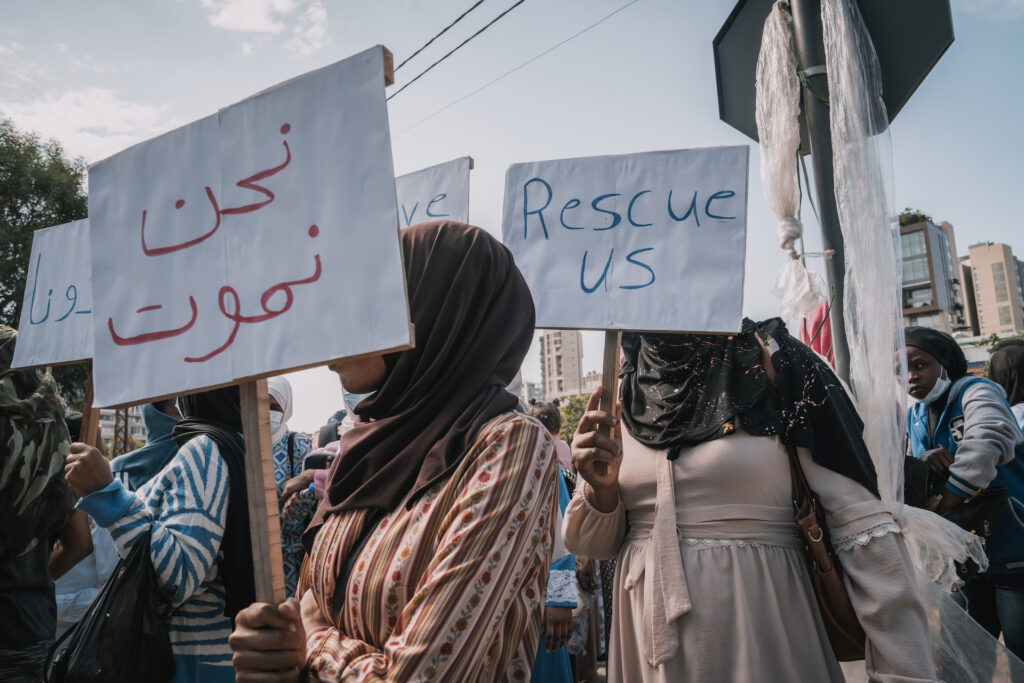
Among the storm: atrocities so horrific that reports emerged last month of at least several women in central Sudan taking their own lives after RSF paramilitary fighters raped them.
On top of that, more than a dozen Sudanese people I spoke with this past week in Lebanon said that internet outages back in Sudan meant they haven’t had contact with their loved ones in months. Some have no clue where their parents, siblings, and relatives are; whether they are safe, or even alive.
“We are living between a war here and a war over there,” multiple people told me throughout this past week.
No Warning
Not everyone in Lebanon has managed to reach safety.
On Oct. 21, late at night, an Israeli strike hit just across from Beirut’s Rafik Hariri University Hospital, the country’s largest public hospital, with no prior “warning.” The attack killed more than a dozen people, according to the health ministry — including one Sudanese man crushed beneath the rubble.
His name was Jamal al-Din Ali. Sudanese Club secretary Adam Ibrahim shows me Jamal’s death notice — on the black background, a serious, steely-eyed young man stares back in a suit and tie. After the deadly Israeli bombing, bystanders told Ibrahim they had found Jamal’s remains among the dozen or so others killed that night.
“We are living between a war here and a war over there.”
According to Ibrahim, Jamal is the only Sudanese citizen the Israeli bombardment has killed since it ramped up in September. He’s been able to confirm only four or five cases of injured Sudanese.
But the war has forcibly displaced several hundred, he estimates, and they had little time to flee.
“We Brought Almost Nothing”
Abdallah Ibrahim Adam, 63, is originally from Sudan’s Darfur region. He came to Lebanon in 2010 and found work as a day laborer. He also met his wife here, Lana, who is from Sri Lanka. The couple had been living with their 13-year-old daughter Nancy and five-year-old son Mazen in Hayy Sallom, a vibrant working-class district in the southern Beirut suburbs, when Israel ramped up its deadly bombing in September.
One of the bombs hit near the family’s apartment, terrifying Nancy and Mazen. It was time to flee — fast.
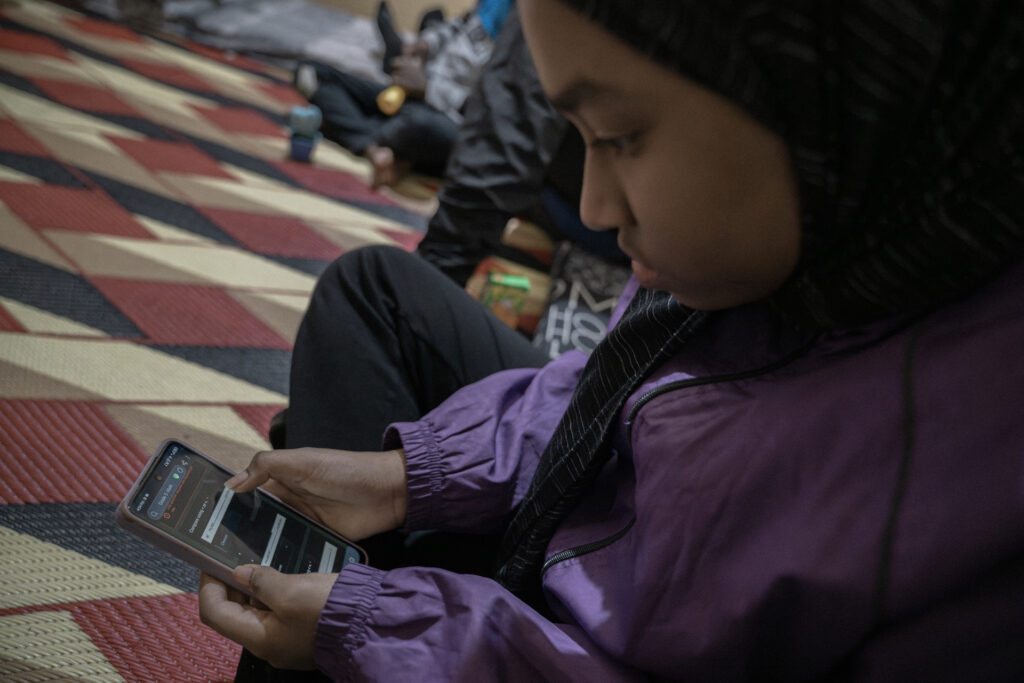
“We brought almost nothing with us,” Adam tells me. More than a month after that day, he and his family sit together on the floor of what used to be the Sudanese Club’s library room, surrounded by mattresses, pillows and blankets. Adam points to some of the pillows: those are all that the family managed to carry with them when they fled Hayy Sallom. mu
It is a life suddenly put on hold by displacement, suspended in a slow limbo amid the dust. Nancy had no chance to bid farewell to Shiraz, her best friend from school in Hayy Sallom, and has not heard from her in weeks. “I don’t know where any of my friends are,” Nancy tells me.
Now starting the new school year, Nancy has no school supplies here in the Sudanese Club, instead simply attending her online classes by cell phone, with spotty internet connection. It’s all there is to do.
“Rescue Us”
Sudanese families trapped in Lebanon are now hoping for help from UNHCR, the United Nations’ refugee agency.
Last Monday, about 100 of them — mostly women and young children — gathered outside UNHCR headquarters in southern Beirut demanding help evacuating Lebanon. Kolshi Angilma, a 21-year-old law student born in Lebanon to Sudanese refugees, helped organize the protest.
“In Lebanon, we cannot be safe. We have to go to another country — maybe Europe, maybe Canada. We can’t go to the official displacement centers,” she adds, amid reports that most of the centers are not accepting non-Lebanese citizens.
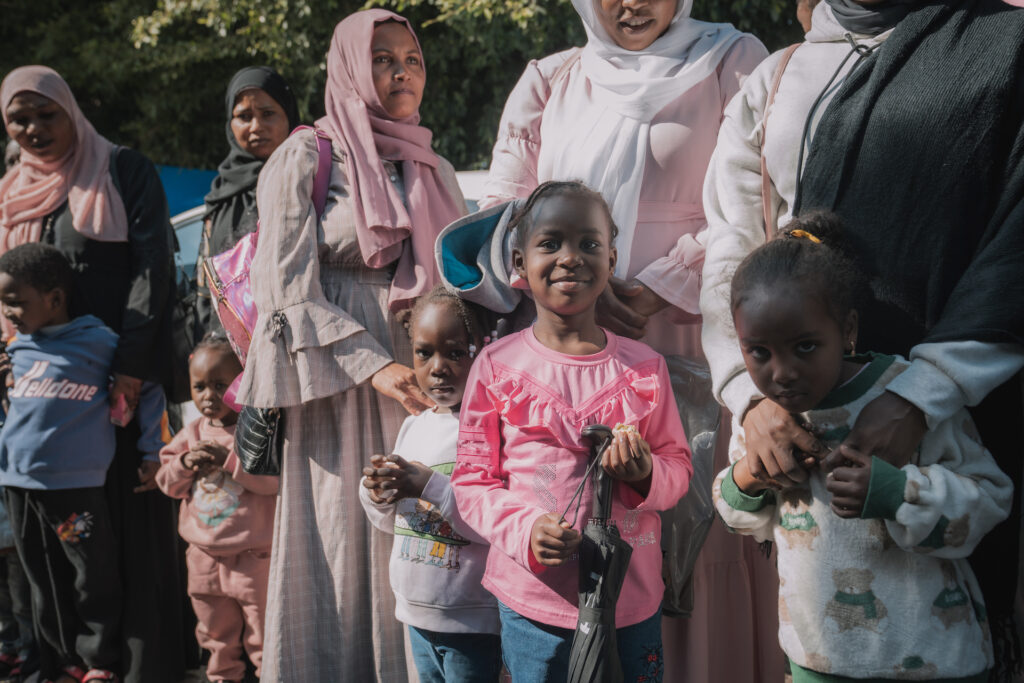
Around Angilma are dozens of women who say that in the meantime, they’ve been sleeping on the street, or crashing at friends’ apartments in areas that Israel hasn’t bombed yet.
Lisa Abou Khaled, a UNHCR spokesperson, said Friday that the agency “is aware of the challenges faced by communities in Lebanon and works to ensure that those in need of international protection receive the necessary support, in accordance with our mandate.” Only some of the Sudanese workers in Lebanon are registered refugees, she says, while for others it’s unclear what agency might help them.
“Anywhere” but Here
Back in his corner of the Sudanese Club, behind the thin curtain that separates his family from the hallway, Ahmed Abdelrazzaq says he, too, has registered refugee status with the UN. He has yet to reach anyone from UNHCR here in Lebanon, though, since he had to flee with his family from Bint Jbeil.
Even if he did, he says he lost his passport and other documents along the harsh journey to Beirut.
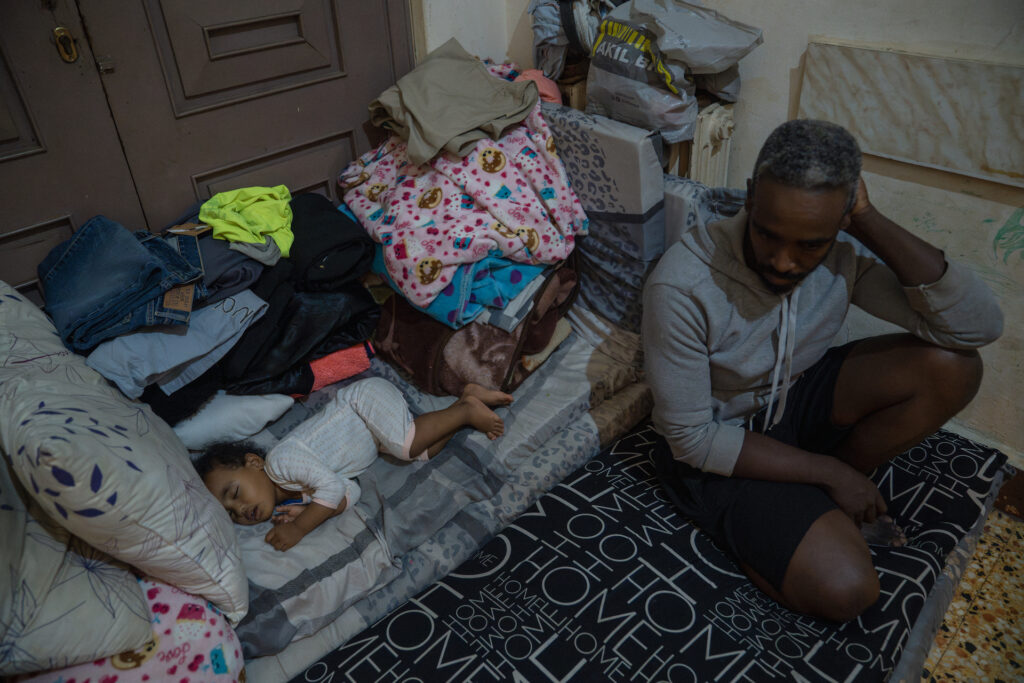
Now, with his wife Ghofran pregnant and due to give birth to their fifth child, he simply wishes to go “anywhere” but here.
Between Syria, Sudan, and Lebanon, no one place quite feels like home, anyway. “I’d even go to the Congo, if I could,” he tells me. Abdelrazzaq’s youngest daughter drifts off to sleep behind him amid the stacks of jeans and polyester fleece blankets. Scrawled across their mattress, in block print: the word “HOME,” repeated many times over in every direction.
“Honestly, home is wherever I can live a normal life, between four walls, with my wife and children.”
*All images by Raghed Waked, a photojournalist and video editor covering war and nightlife.




















